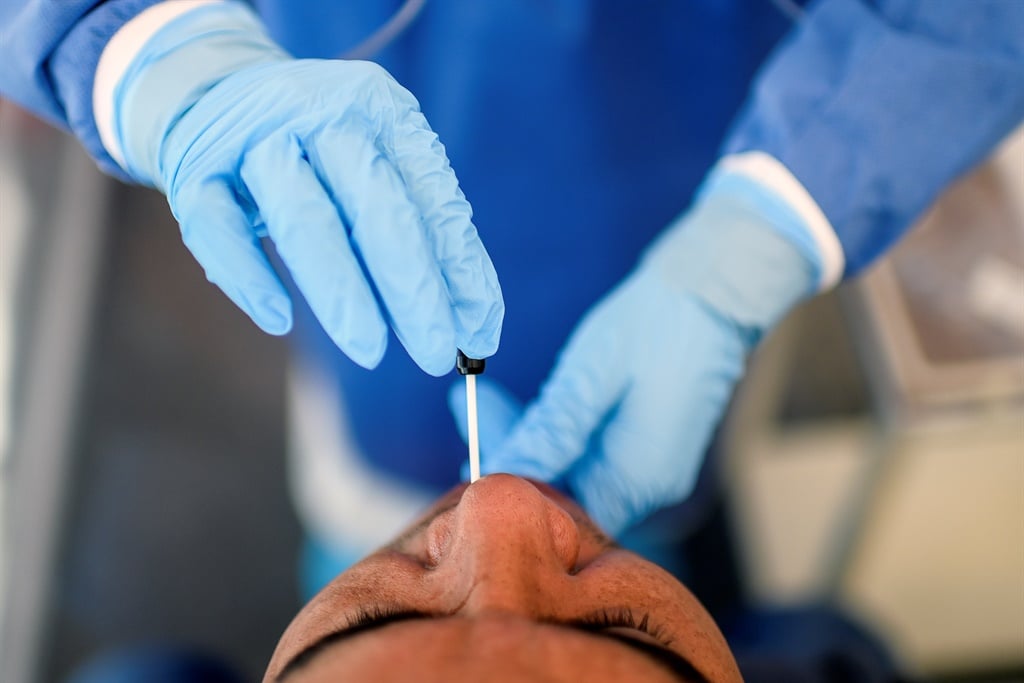


A health worker takes samples from a man to test him for Covid-19 coronavirus. (Pedro Pardo, AFP)
- A nationwide backlog in tests and delays of up to seven to 12 days has made testing for high-risk individuals even more difficult.
- This has contributed to a decision by the Western Cape government to prioritise testing only for those at-risk groups.
- The government has asked the public for its understanding until it can provide more test kits.
The Western Cape government has explained its decision to not test people aged 55 or younger in the Cape Town metro if they have no underlying conditions, as a nationwide backlog is holding up priority tests for those most at risk.
This is a formal new policy that has already been implemented by the provincial health department and City of Cape Town, in the Cape Town metro for now.
Speaking at the Red Cross War Memorial Children’s Hospital, Premier Alan Winde said: “When you have a backlog of tests – and we have 27 000 tests in the backlog [from the Western Cape], some of them taking longer than a week to get a test result – you have to make some management decisions.”
He added it was not an option to wait seven to 12 days to get a test result back for high-risk individuals.
Winde said there were certain tests which had to be completed as the highest priority, adding the first being frontline workers – such as doctors and nurses – and second, those with comorbidities who were over the age of 55.
READ | Pandemic puts pressure on medicine supply
“If you fall into the risk category, we will prioritise testing for you – because we have so few tests, and the speed of getting results back is under pressure.”
He added this would remain the policy “for the next while, while we are waiting to get more test kits into the country”.
“We are asking the public to please understand … please help us.”
Who can get a test?
According to a subsequent statement released by the province, these are the people who can still get tested:
- You are admitted to hospital with Covid-19 symptoms.
- You are over 55 and have Covid-19 symptoms.
- You are of any age, have Covid-19 symptoms, and have one or more of these conditions:
– Diabetes, hypertension or heart disease on treatment.
– Cancer on treatment; tuberculosis on treatment.
– HIV with poor adherence to ARVs.
– Chronic lung disease on treatment (e.g. asthma, emphysema, chronic bronchitis).
- You are a healthcare worker and you have Covid-19 symptoms.
- You live in a care or old age home and have Covid-19 symptoms.
Local and international data shows 90% of people who are infected with Covid-19 will not require hospitalisation, while 10% who are will need healthcare treatment, with some requiring critical care.
‘If you have symptoms, isolate yourself’
Asked what people under the age of 55 with no underlying conditions should do if they detected any typical Covid-19 symptoms, Winde said: “If you think you might have symptoms, we all know the rules: You need to isolate yourself, go home, and keep yourself from your family and friends, so you protect them.
“So, if you’re a young person, fit and healthy, and you’ve got a tickly throat, don’t go and rush in and get a test. Let’s rather save that for someone who is in a hospital. Isolate yourself, wait out the 14 days.”
The Western Cape government’s policy on not testing under 55s was supported today by Pandemics Data and Analytics (PANDA) which has previously made recommendations to President Cyril Ramaphosa.
Dr David Carman of the PANDA said: “We agree with not testing anyone under 55, unless they are healthcare workers or require admission.
“There is a medical maxim that says ‘don’t investigate unless it is going to change your management’. The corollary is that if you do investigate, you had better already know what you are going to do with the result.
“Given the high false negative rate of Covid-19 RT-PCR, a negative result in a symptomatic patient does little to change the way the patient is treated.
“In the tropics, a headache with fever is malaria until proven otherwise. Mid-pandemic, flu-like symptoms are Covid until proven otherwise, and a negative RT-PCR test is not proof – they remain ‘patients under investigation’ [PUIs].
“Therefore the only Covid RT-PCR result that is worth acting upon is a positive result in an asymptomatic person.
ALSO READ | In-hospital tests, contacts and critical care workers to be prioritised – minister
“The asymptomatic people of highest risk are those with confirmed exposure to Covid-19, especially healthcare workers who may be subject to repeated exposure during procedures where the virus may be aerosolised.
“Action is to withdraw the worker from further exposure and ensure rest with good nutrition [especially vitamin D].
“In-patient [symptomatic] PUIs should also be tested, not for change in management, but for whom a positive test will permit admission to a dedicated Covid ward. This is purely a hospital infection control measure.”
As the virus spreads, community testing would also be of less help, Carman argued. “Like malaria in the absence of the Giemsa stain, treatment should be empirical.”

